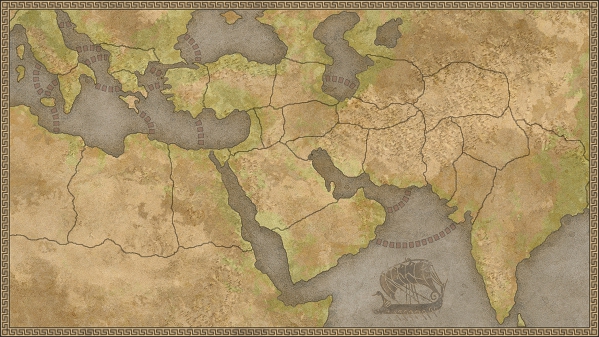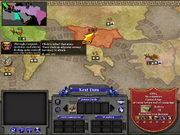| This article is about the campaign. For the unit, see Alexander (Unit). |


|
Mouse over the map to access the atlas entry for each relevant region. |
Intro text[]
Follow in the footsteps of Alexander the Great to conquer the known world of 336 B.C.! Alexander the Great was one of history's most brilliant generals. Alexander was thrust onto the throne at a young age after the murder of his father, the King of Macedonia, in 336 B.C. At the time of his death 13 years later, his empire spanned most of the known world from Greece to India. Follow in his footsteps or forge your own path as you attempt to CONQUER THE WORLD!
The Macedonian Political Situation[]
Alexander was born in 356 B.C. the son of Philip, king of Macedonia and his queen, Olympias, the daughter of the king of Epirus. From the beginning Olympias, who was mentally unbalanced to the point of being consumed by mystery religions, was jealous of Philip's success and protective of her son's right to succeed as King of Macedonia.
Olympias's religious passions and her inability to accept Philip's infidelities led to an estrangement between her and the king. Philip was frustrated and angered by Olympias's strange interests as well as her refusal to accept his infidelities. Because of this, Alexander's parents were soon bitterly parted. Even so, Philip always considered Alexander his son and heir and to prepare him to succeed he employed the greatest philosopher of the era, Aristotle, as his tutor.
Things came to a head when in 337 B.C., Philip divorced Olympias and married a native Macedonian, Cleopatra, the niece of one of his generals, Attalus. Olympias retreated to her native Epirus. At the wedding Alexander and Philip had a confrontation during which Alexander taunted his father as being incompetent. Shortly thereafter, though not shortly enough to prevent Cleopatra from getting pregnant, Philip was assassinated at the wedding of his daughter. Alexander became king and his mother returned from Epirus. Shorty thereafter Cleopatra and her child were killed at the order of Olympias. That which Philip began Alexander would finish and the world would never be the same.
The Macedonian Military System[]
Philip was a political and military genius. He created the military machine that first allowed him to consolidate his political base in Macedonia, then to defeat the league of Greek city-states, which attempted to resist his desire to unite Greece under his rule.
The military machine consisted of a backbone of deep infantry formations known as phalanxes. These formations were inspired by the Greek phalanx, which was eight ranks deep and 256 files wide. In Philip's system a Macedonian phalanx consisted of twelve sytagma of sixteen ranks by sixteen files or 3,072 phalangites formed in a more flexible formation than the Greek phalanx ever achieved.
To this backbone of heavy infantry was added a corps of hypaspists, armed more lightly than that phalangites, but more heavily than peltasts, or light infantry. The hypaspist units were deployed to protect the vulnerable flanks of the phalanx.
In addition, Philip developed a corps of heavy cavalry designed for "shock" action. Under Alexander, these were later to be known as the Companions, as they served as his bodyguard on the battlefield, and followed him into the thickest of the fighting. And thick it was; Alexander was wounded eight times in one battle alone, fighting against the Malli in 326 B.C.
Finally, there were mercenary units of slingers and javelin men. All of this lent flexibility to the Macedonian army, which the armies of the Greek city-states or of Persia or India, did not have.
General information[]

Alexander the Great campaign empire mode.
The Macedonians (Greeks) are the only playable nations in this campaign. The opponents include the other Greek states, Romans, Egyptians, Persians and Indians. You are tasked to conquer the Persians. However, before you can do so, you must unite the struggling separate Greek territories.
Diplomacy is essential in bringing you valuable resources and allies. Remember that the era Alexander the Great lived in is the Classical Age, so be sure that you are accustomed to it.
All battles during this campaign feature the unique campaign-only unit Alexander, and a number of other unique Generals are also available during the course of the campaign.
Historical Campaigns[]
The crossed swords that appear next to scenario titles are indicative of historical battles. The numbers represent the path that Alexander took through the Ancient World. There are twelve such scenarios in the campaign. The historical scenarios in chronological order are:
- Barbarians of Thrace
- Unite the City States
- Halicarnassus/The Granicus
- The Cilician Gates
- Battle of Issus
- The Siege of Tyre
- Battle of the Nile
- Gaugamela
- The Riches of Persia
- The Soghdian Rock
- Battle of the Jhelum
- Crazy Alexander
Non-historical scenarios[]
There are other scenarios found in the campaign. Some of these scenarios aren't based on history, but replicate a situation which Alexander would have discovered had he invaded these areas. Others, such as Capture Darius and Desert Trek, depict events that happened with Alexander, albeit the conclusion of the scenario differs from the actual historical event, or is presented in a non-chronological manner. These scenarios include:
- Megale Hellas
- Samnite War
- Desert Diplomacy
- Desert Trek
- Capture Darius
- Magadha/Maurya and Magadha/Maurya
- Sea Invasion
- Pillage
- Supply Train
- Low Rations
